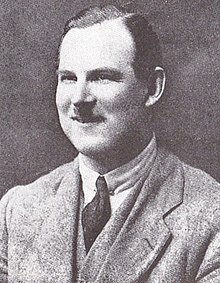C. R. M. F. Cruttwell | |
|---|---|
 Cruttwell as portrayed in Isis, March 1924, alongside a satirical article by Evelyn Waugh | |
| Born | Charles Robert Mowbray Fraser Cruttwell 23 May 1887 Denton, Norfolk, England |
| Died | 14 March 1941 (aged 53) Stapleton, Bristol, England |
| Education | The Queen's College, Oxford |
| Occupations |
|
| Father | Charles Thomas Cruttwell |
Charles Robert Mowbray Fraser Cruttwell JP (23 May 1887 – 14 March 1941) was a British historian and academic who served as dean and later principal of Hertford College, Oxford. His field of expertise was modern European history, his most notable work being A History of the Great War, 1914–18. He is mainly remembered, however, for the vendetta pursued against him by the novelist Evelyn Waugh, in which Waugh showed his distaste for his former tutor by repeatedly using the name "Cruttwell" in his early novels and stories to depict a sequence of unsavoury or ridiculous characters. The prolonged minor humiliation thus inflicted may have contributed to Cruttwell's eventual mental breakdown.
Cruttwell gained first-class honours at The Queen's College, Oxford, and was elected a Fellow of All Souls College, Oxford, in 1911, and he became a lecturer in history at Hertford College the following year. His academic career was interrupted by service in the First World War during which he suffered severe wounds; he returned to Oxford in 1919 and became dean of Hertford, and then principal of the college in 1930. It was during his tenure as dean that the feud with Evelyn Waugh developed while Waugh was a history scholar at Hertford in 1922–1924. Waugh pursued this hostility until shortly before Cruttwell's death.
Cruttwell's term as Hertford's principal saw the production of his most important scholarly works, including his war history which earned him the degree of DLitt. Beyond his college and academic duties Cruttwell held various administrative offices within the university, and was a member of its Hebdomadal Council, or ruling body. In private life Cruttwell served as a Justice of the Peace in Hampshire, where he had a country home, and stood unsuccessfully for the university's parliamentary seat in the 1935 general election, representing the Conservative Party. Ill-health, aggravated by his war injuries, caused his retirement from the Hertford principalship in 1939. A mental collapse led to his committal to an institution, where he died two years later.